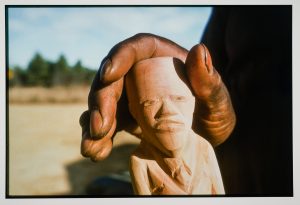OXFORD, Miss. – The University of Mississippi Museum‘s newest installation, “Recent Acquisitions,” highlights the varied and expansive collection of artworks that have been donated or funded by the community in the last 10 years.
Among the selected works are wood carvings, watercolor and oil paintings, pieces that blend the line between painting and sculpture, and a wealth of works created by underrepresented populations in the art community.
“The museum has evolved over the years with what our mission has been,” said Melanie Antonelli, the museum’s curator and collections manager. “Right now, we’re highlighting, of course, Southern art and artists, but we also want our collection to represent our community.”
“Recent Acquisitions” will be on display through March 2024. The museum is open from 10 a.m. to 4 p.m. Tuesdays through Fridays. Admission is free.

‘Untitled (Head of Cedar Walking Cane Carved by Luster Willis, Crystal Springs, MS),’ a 1976 photograph by William Ferris, was donated to the University of Mississippi Museum by Ferris.
Among the dozens of donations and donor-funded acquisitions over the last decade are many pieces from Ole Miss alumni and former professors, Antonelli said.
“We have, with almost every exhibit, someone say, ‘Oh, I didn’t know you had that,’” she said. “This exhibit contains work gained in the last 10 years, but many of them have never been displayed before.
“The goal of any museum is to make art accessible, and that’s what we’re trying to do.”
UM alumnus Michael Rogers’ “Untitled (Dishes in a Sink),” a nearly photorealistic depiction of glassware and plates in a cast iron sink and drain board, sits at the forefront of the collection. Rogers, an African American realist, had his work featured in the National Museum of American Art and the Metropolitan Museum of Art by the time he graduated from Ole Miss in 1981.
William and Marcie Ferris, who Antonelli said have donated the bulk of the museum’s folk-art collection, gifted “Untitled (Dishes in a Sink)” to the university, where it has since been featured in multiple exhibitions throughout the last 10 years.
Highlighting Rogers and other minority and female artists such as Hale Aspacio Woodruff, Dean Mitchell and Marleah Kaufman Hobbs was one of the primary goals of the exhibit, Antonelli said.
“Art as a profession doesn’t always seem attainable for people from underrepresented and minority communities,” Antonelli said. “We wanted people to be able to walk in and see these works from African American artists and women and see these people represented.
‘Signs of the Times,’ a 1992 piece by Dean Mitchell, was given to the University Museum by Melody and John Maxey. The painting is included in the museum’s ‘Recent Acquisitions’ exhibit.
“To have someone like Hale Aspacio Woodruff, who is highly trained and incredibly talented, is important for our students to see.”
Kaufman Hobbs’ work “Burning Man” stands alone on a far wall, only a few dozen feet from its sister piece, “Burning Cars” in the nearby exhibit “The Fall of 1962.” Kaufman Hobbs was a student in 1962 and painted multiple works depicting the riots on campus during the integration of Ole Miss.
“Burning Man” shows a man made of flame surrounded by figures of smoke in an abstract representation of the violence she witnessed on campus.
Kaufman Hobbs donated “Burning Man” to the museum in memory of her late husband, Edward Henry Hobbs III, a UM political science professor and vocal supporter of James Meredith’s integration of the university.
Other works in the exhibit come from well-known names such as Theora Hamblett, William Dunlap and Laurin McCracken.
“I hope with all of the variety – the different mediums and subjects and artists – everybody can find something that they can identify with, regardless of what that may be,” said Andrea Drummond, membership, events and communications coordinator for the museum. “There are so many different kinds of art on display here.”
Without the support of the community, such an exhibit wouldn’t be possible, Antonelli said.
“This isn’t a traditional exhibit, it’s more about celebrating our donors and our community,” she said. “It lets people appreciate the breadth of our collection.”